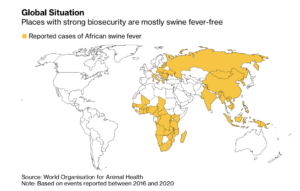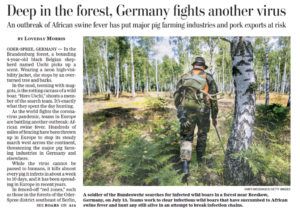Newsweek's Jasmine Laws reported Tuesday that wholesale "egg prices in the U.S. have fallen to $3.45 per dozen, reaching their lowest level in nearly five months, following a period of…
Biosecurity and Pig Health in Focus to Combat African Swine Fever
Bloomberg News reported this week that, “China is taking hog biosecurity to new levels — 13 stories in fact.
That’s the height of a building in southern China where more than 10,000 pigs are kept in a condominium-style complex, complete with restricted access, security cameras, in-house veterinary services and carefully prepared meals.
“The seemingly luxurious conditions represent a state-of-the-art approach to biosecurity in which pigs — the main source of meat in China — are shielded from viruses, including the devastating African swine fever that wiped out half the nation’s hogs in the two years before the coronavirus pandemic emerged.”
The Bloomberg article stated that, “Nicknamed ‘hog hotels,’ these gigantic vertical farms are being built by companies, including Muyuan Foods and New Hope Group, emulating the strict controls major suppliers in other countries have used to prevent outbreaks of the devastating disease.
“China is copying best-practices from Europe and the U.S. to close its biosecurity gap, said Rupert Claxton, the U.K.-based meat director at consultant Gira, who has been providing advice to farmers and businesses for two decades. ‘In 20 years, it’s done what the Americans took probably 100 years to do,’ he said.”

This week’s article pointed out that, “In developed countries, pig production is dominated by bigger farms in fewer hands. This has been seen for decades in the U.S., Denmark and Netherlands, which have among the best biosecurity standards globally and never reported a single African swine fever outbreak in recent years.”
“New Hope Group recently completed three five-story buildings across an area the size of 20 football fields, or 140,000 square meters (1.5 million square feet), in Beijing’s eastern Pinggu district. The facility, which can be smelled from about a kilometer away, will eventually produce 120,000 pigs annually, making it the largest in the Beijing area,” the Bloomberg article said.
And Loveday Morris reported on the front page of Monday’s Washington Post that, “As the world fights the coronavirus pandemic, teams in Europe are battling another outbreak: African swine fever. Hundreds of miles of fencing have been thrown up in Europe to stop its steady march west across the continent, threatening the major pig farming industries in Germany and elsewhere.
“While the virus cannot be passed to humans, it kills almost every pig it infects in about a week to 10 days, and it has been spreading in Europe in recent years.”

The Post article indicated that, “In fenced-off ‘red zones,’ such as those in the forests of the Oder-Spree district southeast of Berlin, teams work to clear the area of the infectious wild boars that have succumbed to the sickness and hunt any still alive in an attempt to break infection chains.”
Ms. Morris stated that, “The arrival of the virus in the wild boar population in Germany last year triggered bans on pork exports to countries outside Europe, wiping out $867 million in sales to China. Then, in mid-July, the first case was discovered in a domestic pig farm in Germany, exactly the spread that the teams picking through the forests had been hoping to prevent.”
The Post article added that, “With German pork exports blocked outside the E.U., countries such as Spain have stepped in to help meet China’s pork appetite. China itself has had its own struggles with swine fever, with nearly half its own herds estimated to have been wiped out by outbreaks in 2018 and 2019.
“The discovery of the virus at two Brandenburg region pig farms in July was a ‘huge catastrophe for Brandenburg’s farmers,’ said Tino Erstling, a spokesman for the Brandenburg State Farmers’ Association. But Germany is still able to export within the E.U. from regions without the virus.”
Biosecurity is critical to protect the swine population from diseases such as African swine fever. By practicing good biosecurity, you can reduce the risk of people, animals, equipment, or vehicles carrying infectious diseases onto your property. More at: https://t.co/lo6OGbPMbc
— USDA APHIS (@USDA_APHIS) August 2, 2021
Although China’s pig population has returned to near normal levels from the resurgence of African Swine Fever, pockets of the disease still persist.
And recent flooding in China has raised concerns of new disease outbreaks in parts of the country.
Following the news that African Swine Fever was discovered recently in the Dominican Republic, Reuters writer Ezequiel Abiu Lopez reported this week that,
The Dominican Republic will slaughter tens of thousands of pigs after detecting outbreaks of African swine fever in 11 of the country’s 32 provinces, authorities said on Monday.
“Announcement of the slaughter comes after authorities sent 389 samples from pig farms across the country to U.S. laboratories after registering the widespread death of animals in three provinces in the last month,” the Reuters article said.





